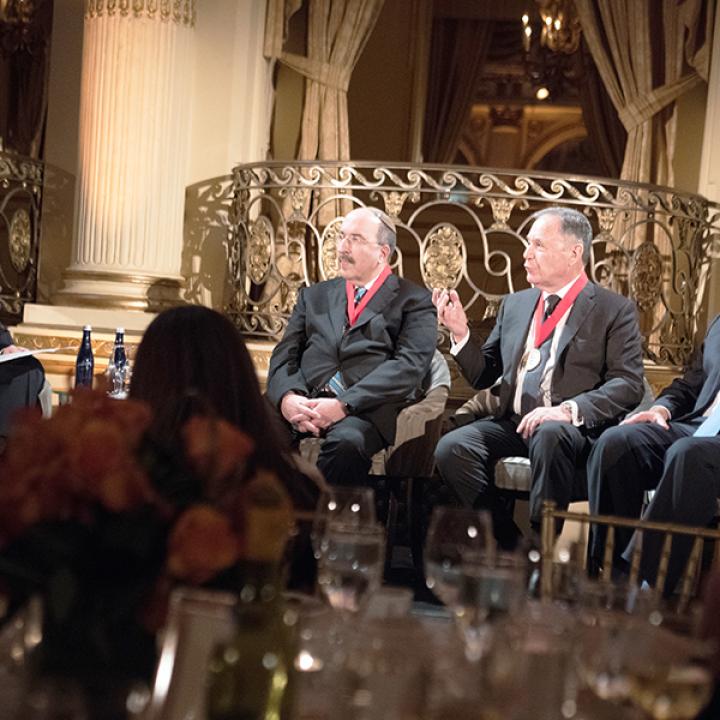
- Policy Analysis
- Interviews and Presentations
For Israel at the UN, Quiet Respect and Continued Public Hostility

Watch the full conversation between Institute executive director Robert Satloff and 2017 Scholar-Statesman Award honorees Dore Gold, Dan Gillerman, and Ron Prosor, who each served as Israeli ambassador to the United Nations.
On December 5, 2017, the Washington Institute for Near East Policy honored three former Israeli ambassadors who fought for justice and fairness at the United Nations: Dore Gold, Dan Gillerman, and Ron Prosor. The awards ceremony, held in New York City, took place on the eve of the 70th anniversary of the ratification of the UN's Partition Plan for Palestine. Institute executive director Robert Satloff led a lively conversation with Ambassadors Gold, Gillerman, and Prosor about Israel's relationship with the world body, institutional bias against the Jewish state, and prospects for leveraging improved bilateral ties to create opportunities for Israeli interests in multilateral forums.
Asked about the relevance of the UN to Israel 70 years after partition, Gillerman said, "I don't think there's another arena in the world which enables an Israeli diplomat to bring that message to 193 countries of what a country Israel really is, how different it is in reality to the perception - its beauty, its creativity, its innovation, its compassion, its contribution to the world. If you do not apologize, if you're not ashamed, if you're proud of your country and you fight for it, you can achieve great things - even at that glass building on First Avenue."
Prosor explained why he believes that the UN is "structurally and institutionally biased against Israel," pointing to the lack of Israeli citizens in senior staff positions and the exclusion of Israel from many regional groups and committees. But bilateral relations offer Israel the opportunity to improve its standing at the UN. "Under the radar screen, Israel is building a lot of inroads to countries that appreciate the amazing work we are doing."
As an example of how effective bilateral diplomacy can pay dividends in multilateral forums, Prosser noted that when Israel needed General Assembly votes for a measure and the Seychelles delegation had to leave New York temporarily, the island nation – and Israeli aid recipient -- deputized him to be its representative for the day and he voted in favor of the Israeli proposal.
Gold expanded on the relationship between Israel's bilateral relations and its treatment in multilateral forums. "We're having a renaissance right now in terms of how Israel is operating in the Pacific East, in Africa, in Latin America, and just basically worldwide - even with Europeans, who tend to come up with bad ideas when they work together in Brussels," he said. "On an individual level, it's extraordinary. The problem is, once you take these extraordinarily good relations and you put them in a multilateral framework, the dynamics of countries working together works against us."
Given the structural and institutional biases of the UN, all three former Israeli ambassadors agreed on the importance of their country's relationship with the United States. "Without the United States," Prosor said, "Israel would be chopped liver at the United Nations."
Other areas of agreement among the ambassadors included rejecting a UN role in the Israeli-Palestinian peace process and a call to reform and improve UNRWA, the UN's relief agency for Palestinian refugees.
Noting that the UN seats member delegations alphabetically, with Israeli representatives typically just a few chairs away from their Iranian counterparts, Gillerman described the slow evolution of his contacts with Tehran's UN ambassador at the time. "For the first two years we used to pass each other and I had really very close relations with every ambassador except two: The Syrian, and the Iranian. Mohammad Javad Zarif wouldn't even acknowledge me. After about two years, we exchanged smiles. At a certain point we even had some discussions in the corridor whereupon one of his colleagues saw him smiling at me and he was recalled to Tehran for three months for being, quote, 'too nice to the Israeli ambassador.'" Zarif now serves as Iran's foreign minister.
Speaking about what service as UN ambassador meant to him, Prosor said, "Every day, when I came to the United Nations and saw 193 flags out there, I saw 25 flags with crosses on them. I saw 15 flags with a crescent on them. I only saw one flag with a Magen David. We all should be working every day to make sure that this flag hangs tall and proud in the family of nations, where it belongs."






